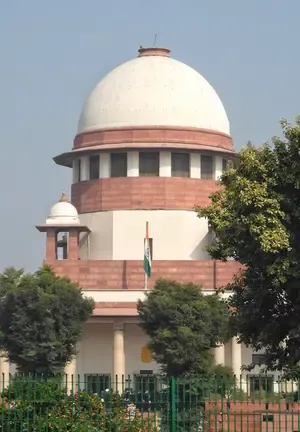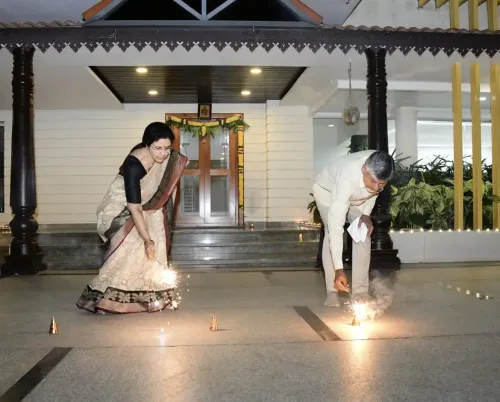Can the Threat of Burning Cinemas Stop the Release of a Film? SC Weighs In on 'Thug Life' Controversy

Synopsis
Key Takeaways
- The Supreme Court emphasizes the rule of law in artistic expression.
- Karnataka's ban on 'Thug Life' is deemed unconstitutional.
- Freedom of speech and expression must be protected.
- Judiciary plays a crucial role in upholding fundamental rights.
- Public discourse on artistic freedom is essential.
New Delhi, June 17 (NationPress) The Supreme Court made pointed comments regarding Karnataka's “unlawful ban” on the release of ‘Thug Life’ — a film directed by renowned filmmaker Mani Ratnam and featuring superstar Kamal Haasan.
“The rule of law dictates that any film possessing a CBFC certificate must be released, and it is the responsibility of the state government to facilitate its screening. The threat of cinemas being set ablaze cannot be a reason to inhibit a film's release. We are not mandating that people watch the film, but it should be made available,” stated a Bench led by Justice Ujjal Bhuyan.
The apex court was addressing a writ petition submitted by M. Mahesh Reddy from Bengaluru, who claimed that despite the film receiving certification from the Central Board of Film Certification (CBFC), the Karnataka government had obstructed its theatrical release through verbal directives and police interference.
“We cannot permit mobs and vigilante groups to dominate the streets. The rule of law must prevail,” the Bench, which also included Justice Manmohan, emphasized to the counsel for the Karnataka government.
“This issue pertains to the rule of law and a fundamental right. The Supreme Court serves as the guardian of both the rule of law and fundamental rights. It transcends being merely a video or a film; it represents something far more significant,” added Justice Bhuyan.
The court instructed the Karnataka government to submit its counter-affidavit by Wednesday and scheduled the matter for further deliberation on Thursday, June 19.
When the Karnataka government's counsel noted that following the controversy over Haasan’s comments regarding the origins of the Kannada language, the film's producer had approached the Karnataka High Court for protection, the Supreme Court mandated that the pending petition be transferred to itself. Additionally, it expressed discontent with the Karnataka High Court's recommendation for Kamal Haasan to apologize.
During the film's audio launch, Kamal Haasan remarked that “Kannada is derived from Tamil,” which triggered significant backlash in Karnataka. After the actor declined to issue a formal apology, the film's release in the state has been indefinitely postponed.
Last week, the Supreme Court sought responses from Karnataka’s Chief Secretary, Principal Secretary (Home), and Director General of Police regarding the matter, rescheduling the petition for hearing on June 17.
Advocate A. Velan, representing the petitioner, argued that Karnataka’s “unlawful ban” constituted an unconstitutional infringement on the freedom of speech and expression guaranteed by Article 19(1)(a) of the Constitution.
Velan asserted that the Karnataka government has entirely “capitulated” to extremist factions that have threatened linguistic minorities and called for theaters to be burned.
The petition states that the ban is rooted in a deliberate campaign of terror, including direct threats of arson against cinemas, incitement to widespread communal violence targeting linguistic minorities, and a chilling call for a recurrence of historical anti-Tamil riots.
“This environment of intimidation is a blatant violation of the Fundamental Rights to Freedom of Speech and Expression (Article 19(1)(a)) and to Practice any Profession (Article 19(1)(g)). More alarmingly, it represents a calculated assault on the secular fabric and public order of the state,” the petition asserted.









